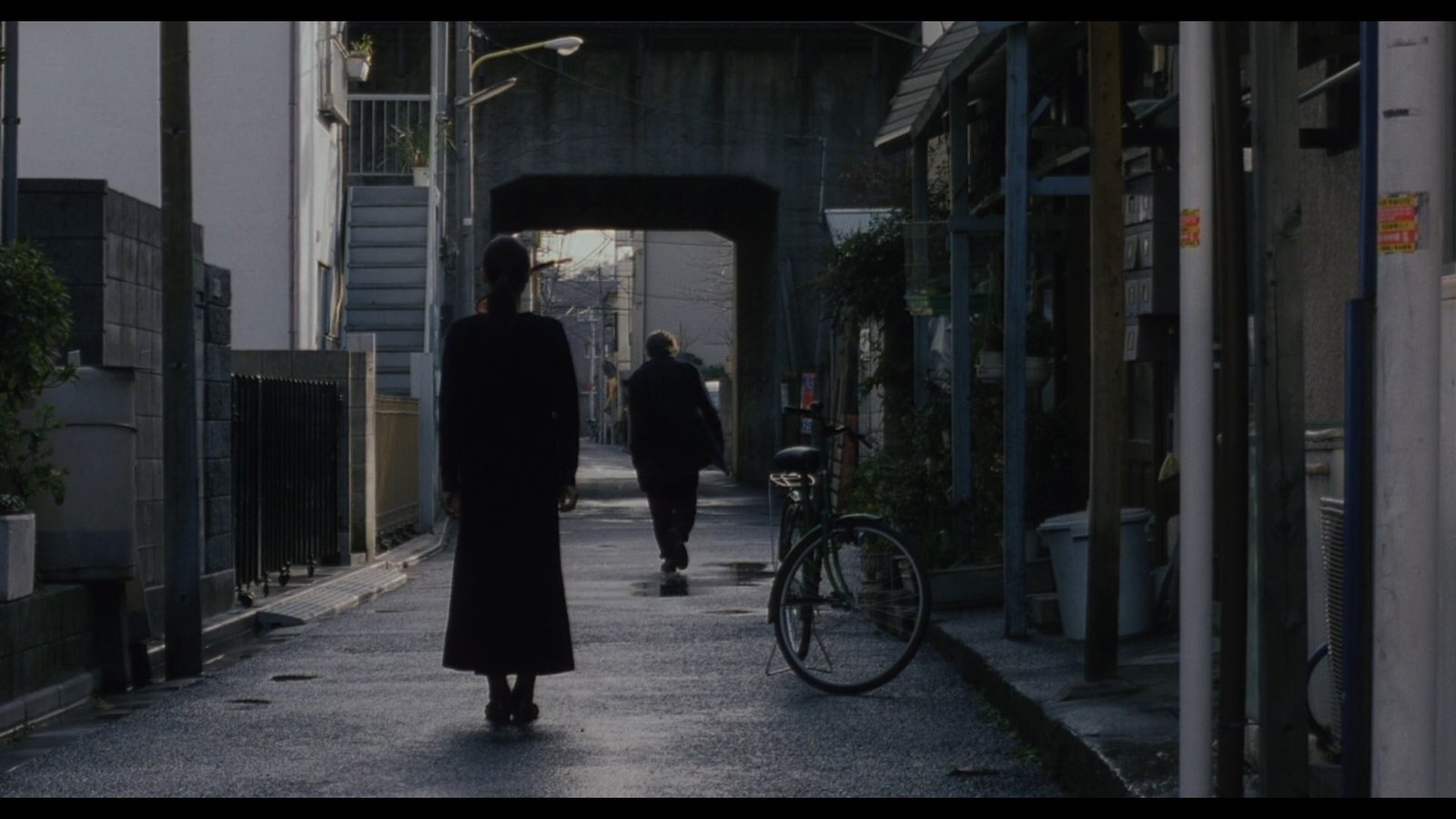
Hirokazu Kore-eda makes somber, majestic movies about quietly sad individuals, individuals whose lives have not delivered every thing they hoped for, however who nonetheless maintain a candle to tomorrow. You possibly can draw a direct line from his work to the attractive movies of Yasujiro Ozu; Like Ozu, Kore-eda understands that the essence of our lives is just not captured within the nice acts of resistance or reinvention, however within the numerous, usually obscure moments in between, in addition to within the areas by which we spend these moments. I think about they discover some type of redemption in venerating these segments and silences; for the lonely, longing, and perpetually non-committal, the wonder each administrators discover in our each day interactions is a deep consolation.

It is becoming, then, that they are each masters of immobile lengthy takes; sequences by which the digicam merely hangs on the ground of their characters’ properties, capturing all of the incidental ephemera of their lives, and the continuing negotiations of intention that inform each informal dialog. Whereas most of our tales provide an escape from the mundane, Kore-eda testifies that it’s within the mundane and neglected that lurks the essence of coexistence, and maybe the premise of affection past it. We aren’t most ourselves in our moments of triumph and tragedy; our true nature lies in between, in the best way we behave when there is no such thing as a nice battle on the horizon, and within the individuals and locations we select and go to usually.
It’s no shock that Maborosi opens not with a second of overt motion, however with a second of preparation: a younger girl fussing along with her hair as she addresses a hand mirror, clearly nervous about what’s to come back. There may be extra vulnerability, extra vitality on this second than you may count on – the truth is, it’s in these moments of anticipation and concern that our interior selves are revealed. Kore-eda will definitely additionally convey our moments of triumph, however it’s these moments that present context for the arduous trials, inform who we try to be within the mild of day, and inform us within the viewers how nicely these characters have succeeded. in reaching their most optimistic self-image.

Because the ringing of a bicycle bell calls our topic exterior, Kore-eda’s compositional philosophy is instantly vindicated. A nonetheless lifeless alley presents a silent universe of implications, instantly linking darkness to security and uncertainty to mild, this lady to the brink and her departing grandmother to the good, forbidding past. Why ought to the digicam transfer when each nonetheless picture is a superbly composed tapestry, with the interaction of sunshine and darkness, faces and objects all conveying such a novel, mesmerizing impact? I am struggling to not repeat myself, however ‘majestic’ actually is the phrase for his visible fashion – not simply lovely, however someway inherently stately, turning dilapidated group properties and uncared for alleys into scenes simply as wondrous and worthy as any act of painted worship. . Kore-eda’s cinematography is his thesis; he sees a lot that’s fantastic and price celebrating in each incidental life story, and when it’s positioned subsequent to the attention of his digicam, it’s not possible for us to not see it too.
Kore-eda’s cinematography equally mirrors Ozu in his strategies of conveying and appreciating spatial distance. His setups usually enable the digicam’s eye to see by a number of rooms or layers of motion, balancing the relative stillness of his compositions with their potential to seize the small actions all through the panorama of a tunnel or hall, demonstrating how even may be moments of peace. nonetheless characterised by personality-rich incidental actions. This additionally applies to the inherent loneliness of his characters; within the context of those compositions we see that regardless of their emotions, they’re by no means utterly alone.

Given all this, there may be clearly nice weight within the movie’s first phrases, spoken by our topic’s retreating grandmother. She catches up along with her on the bridge and begs her to return house, to which her grandmother responds, “I need to die at house, so I am going again to Shikoku.” This isn’t only a persistent, sentimental need; within the worlds of Kore-eda, the connection between individuals and their setting is at all times clear, bordering on sacred. We aren’t simply ourselves, we’re reflections of and mirrored within the environments by which we select to dwell. Our lives are spent in a discordant sequence of rooms that all of us wrestle to make our personal. Is it any shock that we’d need to die within the rooms by which we have now created such extensions of ourselves?
This opening scene is a reminiscence conjured up in a dream, however it’s also a microcosm of the movie to come back. Maborosi is a spare, quiet movie even by Kore-eda’s requirements; all of the touchstones that outline it are current in heroine Yumiko’s dream of the day she made her grandmother run away. The mirror, an instrument with which we affirm and strengthen our identification, within the hope that our reflection can present some clue as to our true nature. The bell, a name from exterior, an emblem of security, now twisted right into a reminder of loss. And that withdrawal, not permitting prayer or arguing, solely asking questions, whereas these we love disappear from us without end.

Yumiko wakes up as a younger grownup with a husband and son and shortly experiences a repeat of her grandmother’s stately departure. Her husband is Ikuo; he works in a close-by manufacturing unit and the couple makes their dwelling in a small condominium in Osaka regardless of restricted sources. Neither is totally certain of his place, and neither is prepared to confess it; as an alternative, they categorical their doubts and regrets by commentary on reflections. Yumiko is dissatisfied with their grownup selves, speaking about how her “freckles began to trouble her” whereas staring into a toilet mirror, whereas Ikuo finds his reflection in a former sumo wrestler turned truck driver. “I do not know why he is sporting that topknot… one thing about it depresses me a bit.” Yumiko offers along with her fears by expressing them and retains the spark alive by acts of romantic spontaneity. Ikuo says nothing, after which at some point walks in entrance of a practice.
The second half of Maborosi is essentially involved with Yumiko as soon as once more pursuing his retreat, looking for solutions and discovering little to fulfill. A complete life is a wierd factor; issues appear unchangeable till the adjustments are irreversible, after which we’re left adrift, not anchored in a life and setting that displays our personal self-image. Yumiko remarries the industrious Tamio, who lives along with his daughter Tomoko in a small coastal city. She strikes there along with her son Yuichi, however the mirrors and bubbles appear to observe her – the image of her shattered self-image and the decision of her absent first husband, along with the final time her life felt sure of route. Such multifaceted symbols are sadly inescapable. They name to her from bed room corners and puddles on the road, from passing bicycles and the lips of her colleagues. “Are you certain there have been no indicators?” “He did not appear any completely different from regular.” Like her grandmother, she should assemble that means of their absence, realizing that solely her earlier understanding of their lives was a lie. Is there a solution hidden in these hills, in these huge clean canvases and the roar of the ocean?

The remainder is simply life. Yumiko lives in Tamio’s village, integrates as finest she will, is reminded of Ikuo’s loss of life, retreats and walks ahead. In One Hundred Years of Solitude, Gabriel Garcia Marquez distills the essence of life right into a easy name and response: “What do you count on? Time passes.” “That is the way it goes, however not by a lot.” The weathering of a painted bicycle, the turning of a season’s chilly, the scandalous development of helpless infants into curious youngsters. If the mirror can’t present consolation or reassurance, maybe the subsequent era can. As they courageous the hills and fields of Tamio’s house, Yuichi and Tomoko appear to own extra self-confidence than any grownup might hope for. Their enthusiasm is mirrored within the movie’s most charming composition: the pair operating alongside an embankment excessive above the ocean wall, forming mirrored in nonetheless water, a mirror that for as soon as presents a form we will acknowledge.
In fact, youngsters have it straightforward. Unbound by expectations or decency, they’re free to decide on their very own identification – for the remainder of us, we should inevitably discover definition in reflection, whether or not by the glass of the mirror or in the best way our habits is obtained by others. We’re social animals and none of us possesses an identification that exists other than our reception. And now that Yumiko’s reception is tied to these two retreating backs, it’s certainly tough for her to discover a new place, a brand new function, a brand new self. She hesitates, mourns and accuses, as Kore-eda painstakingly information the small rises and acquainted falls of dwelling in uncertainty, coexisting with grief. His compositions are a consolation; Though Yumiko is surrounded by huge empty areas, her environments replicate not solely her isolation, but in addition the grandeur of every incidental second. Nobody in a Kore-eda movie has to elucidate that life is treasured; in his movies the reward of existence is without end self-evident.

Then why did Ikuo select to commit suicide? And why cannot Yumiko escape his ghost, let the previous be the previous, let Tamio’s home change into her personal? Her emotions waver till the top, when she meets however refuses to get on the practice again to Osaka, after which hears a sound ringing within the distance. A funeral procession led by Ikuo’s inescapable bells drew her to the surf. Disappointment is as inescapable as these jingling bells, because the threatening clouds; we should discover a strategy to additionally search happiness wherever our pursuit takes us. Every little thing we’re is fleeting, a short interval of transition between the chilly earth and the grey sky – however my god, how fantastic that piece of expertise is. As Kore-eda’s digicam proves, there may be a lot price having fun with on this life.
Yumiko stands on the dock and stares on the bonfire, her reflection wavering within the water under. ‘I simply do not perceive. Why did he commit suicide… why did he stroll alongside the tracks. Why…why do you assume he did it?” To this, Tamio presents a solution that he inherited from his father. “Dad usually went out to sea. He says that when he was alone, he noticed a good looking mild, shimmering within the distance, calling to him. I feel it might occur to anybody.”

The 2 stand alone between the rocks and the water, previous and future, reflection and self. Yumiko thinks about this reply, enthusiastic about how good it’s to have individuals who love you, however that may not at all times be sufficient. There is no such thing as a level – no accountability, no blame, no cause we will simply assign. The ocean calls us, and a few of us will reply. That is all.
“What lovely climate we have now,” she says a while later, admiring the cove that has change into her house. “An exquisite season certainly,” Tamio’s father agrees. She walks previous him and rushes to affix her husband and youngsters and assist Yuichi grasp his model new bike. Their shapes change into vague as they spin and embrace, mixing into the panorama of the coastal city. It is a good looking day.
This text was offendede potential by reader assist. Thanks all for every thing you do.



